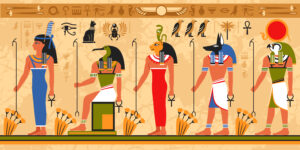It is a Passover tradition to have an extra place at the seder table for the prophet Elijah. It’s a fun part of the celebration to expect Elijah at this time: we leave the door open, call his name, and prepare a place for him in expectation. I saw a Passover haiku (form of short poetry) which read:
On Passover we
Opened the door for Elijah
Now our cat is gone.
Elijah came about 500 years after the Exodus from Egypt. The first Passover is thought to have happened over three thousand years ago, and Elijah was taken from the earth in 849 BC. How did he get mixed up in all of this? What has Elijah got to do with Passover?
Passover: Elijah ushers in the Great Redemption
Understanding Elijah’s part at Passover is impossible if we do not understand the Jewish concept of ‘geula’ or redemption (גאולה).
The theme of redemption is central to the Feast of Passover, as Israel was set free from slavery. However, both Jews and Christians can all agree that the feast prophetically points to another level of redemption to come. It lays down a pattern for the Ultimate Redemption.
Christians interpret this, by and large, to be the pivotal weekend when the Messiah redeemed us from sin by surrendering His life to be our Passover Lamb. Jewish people, on the other hand, look to the “Great and Terrible Day of the Lord”, when the Messiah will come to rule and reign.
But could it be that both are right?
Christians often think Jewish people are missing a trick or two in their expectation that the Messiah would come to crush their enemies, but that’s because Christians forget that that’s exactly what the Bible describes over and over again. The second coming of Jesus is woven all through the Old Testament—not just the book of Revelation. The reason Jewish people expect a mighty warrior is because that is what has been promised.
The Messiah is coming with a winnowing fork to sort the wheat from the chaff, and the future for the chaff is not looking good. All of us who love righteousness long for Him to come and put things right—to establish His kingdom rule and do away with wickedness. The only reason for delay is to extend the chance for the wicked to repent and be saved. Ismar Schorsch from the Jewish Theological Seminary puts it like this:
With the door ajar, we intone four verses that call upon God to visit those who have afflicted Jews with retribution. In the contemporary Seder, the moment lends itself to remembering the obscenity of the Holocaust… The impact of historical events on the mood of the Haggadah merely rendered what was implicit explicit. The original matrix had been set long before by the haftarah: a second redemption would right the wrongs of history.1
And that’s what all creation is groaning for: wrong to be put right by our loving Creator.
Shabbat haGadol
On the Shabbat before Passover, the reading (the haftarah) comes from Malachi chapters 3 and 4. Schorsch explains that the choice of this haftarah from Malachi added a messianic undertone, bringing messianic anticipation to the celebration as well as the comfort of looking back on what God has done.
Passover looks back on God’s redemption of Israel when He delivered us from Egypt, but also forwards to the Great Redemption of the whole world which is yet to come.
Here’s how Malachi chapter 3 begins:
“Behold, I am sending My messenger, and he will clear the way before Me. Suddenly He will come to His Temple—the Lord whom you seek—and the Messenger of the covenant—the One whom you desire—behold, He is coming.” (Malachi 3:1)
Guess who the messenger is who will come and prepare the way? Elijah. His identity is revealed at the end of the book.
“Behold, I am going to send you Elijah the prophet, before the coming of the great and terrible day of Adonai. He will turn the hearts of fathers to the children, and the hearts of children to their fathers—else I will come and strike the land with utter destruction.” (Malachi 4:5-6)
Jesus identified John the Baptist as fulfilling this prophecy (Matthew 11:14). John the Baptist indeed fulfilled the herald’s role, preparing the way for the Messiah, and John himself understood his role was that prophesied in Malachi, echoing the words about winnowing and burning away the chaff:
“As for me, I immerse you in water for repentance. But the One coming after me is mightier than I am; I am not worthy to carry His sandals. He will immerse you in the Ruach ha-Kodesh [Holy Spirit] and fire. His winnowing fork is in His hand, and He shall clear His threshing floor and gather His wheat into the barn; but the chaff He shall burn up with inextinguishable fire.” (Matthew 3:11-12)
The fact that Jesus did not come bearing a winnowing fork disqualified Him in the sight of many Jewish people, but as we know, much of Scripture carries both the “now” and the “not yet” at the same time.
Yes, John the Baptist was Elijah. Yes, Jesus is the Messiah who came 2000 years ago to bring redemption. But yes, there is more to come: Elijah will precede the second coming of the Messiah, who will usher in His kingdom rule and fulfil the longing of our hearts.
He will redeem all things to Himself. His first coming did not involve the burning of chaff that John proclaimed, but His second will.
Promises for Israel
Who can endure the day of His coming?
Or who can stand when He appears?
For He will be like a refiner’s fire,
and like soap for cleaning raw wool.
And He will sit as a smelter or a purifier of silver,
and He will cleanse the sons of Levi,
and purify them like gold or silver.
Then they will become for Adonai
those who present an offering in righteousness. (Malachi 3:2-3)
In this passage we see God making promises to Israel which have not yet come to pass. He promises to purify Israel, and that they will be pleasing to Him once again. He promises not to consume Israel in judgement, and also that they will be back in the land, being a blessing to the whole earth.
“All the nations will call you blessed. For you will be a land of delight.” (v.12)
“So they shall be Mine,”—says Adonai-Tzva’ot—“in the day I make My own special possession. So I will spare them, as one spares his son serving him.” (v.17)
Clearly, these things are still to come. At the moment, the nations rage and we are warned that eventually all will turn against Israel (Zechariah 12:3). Yet this promise to be globally recognized as a blessing will one day come to pass. We also see similar promises of redemption and transformation of Israel in relation to the world throughout the prophets, in Isaiah, Ezekiel and Zechariah.
The beginnings of redemption
In Jewish expectation, the beginnings of the geula, the Messianic expectancy, will inevitably involve sufferings, troubles and wars for Israel… as well as the physical restoration to the land of Israel before the Messiah is to come. There is also the expectation of national salvation, a conviction that Paul the Apostle shared:
For I do not want you, brothers and sisters, to be ignorant of this mystery—lest you be wise in your own eyes—that a partial hardening has come upon Israel until the fullness of the Gentiles has come in; and in this way all Israel will be saved, as it is written,
“The Deliverer shall come out of Zion.
He shall turn away ungodliness from Jacob.
And this is My covenant with them,
when I take away their sins.”
Concerning the Good News, they are hostile for your sake; but concerning chosenness, they are loved on account of the fathers— for the gifts and the calling of God are irrevocable. (Romans 11:25-29)
This certainty of God’s irrevocable promise to Israel still stands.
“For I am Adonai. I do not change, so you, children of Jacob, are not consumed. From the days of your ancestors you have turned aside from My statutes, and have not kept them. Return to Me, and I will return to you.” (Malachi 3:6-7)
When the people of Israel have regathered to their land, when Jerusalem calls out to their Messiah “Blessed is He who comes in the name of the Lord”, the Messiah will come. But not for the first time – He said He would return. And He will put all things right. Prepare the way of the Lord!
- Ismar Schorsch, Pesah: The Great Redemption, The Jewish Theological Seminary / בית המדרש ללימודי יהדות, April 23 2005
Photo by Artem Labunsky on Unsplash
















